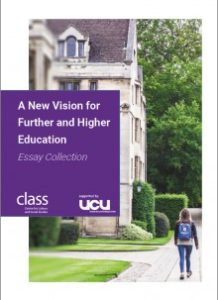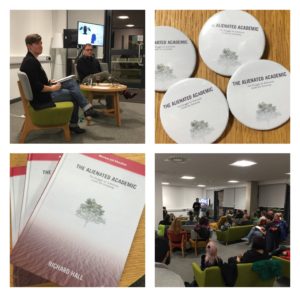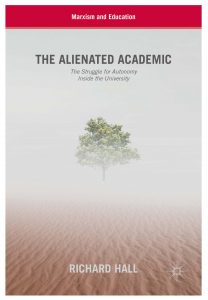I have an article accepted for publication in a special issue of Social Epistemology: a Journal of Knowledge, Culture and Policy that picks up on some work I have been doing previously on authoritarian neoliberalism (see presentations and notes from a BERA Special Interest Group symposium here and here). The article also attempts to maintain some momentum around academic labour, academic practice, knowledge formation and the critical terrain of decolonisation. In this, I explicitly connect to Audre Lorde’s work on life as a poetic existence.
The special issue as whole looks at the intersections of higher education and the University, neoliberalism as a contested terrain/heuristic, technologies and technocratic forms of management, and subjectivities. My abstract and references are appended below. The other contributors and pieces are as follows.
Robert Antonio: ‘Ethnoracial Populism: An alternative to Neoliberal Globalization?’
John Holmwood and Chaime Marcuello-Serovs: ‘Challenges to Public Universities: Digitalisation, Commodification and Precarity’
Elio di Muccio: ‘Core HR in British Higher Education: For a Technological Single Source and Version of the Truth?’
Justin Cruikshank: ‘Economic Freedom and the Harm of Adaptation: On Gadamer, Authoritarian Technocracy and the Re-Engineering of English Higher Education’
Liz Morrish: ‘The Accident of Accessibility: How the Data of the TEF creates Neoliberal Subjects’
Ross Abbinnett: ‘The Anthropocene as a Figure of Neoliberal Hegemony’
Jana Bacevic: ‘Knowing Neoliberalism’
ABSTRACT
As one response to the secular crisis of capitalism, higher education is being proletarianised. Its academics and students are shorn of autonomy beyond the sale of their labour-power. One heuristic for analysing this response is authoritarian neoliberalism, imposed as a means of enacting disciplinary practices in the name of the market with an anti-democratic rationale. This has a distinctly technocratic focus, rooted in techniques of performativity, including audits and assessments of teaching, research and scholarship, grounded in productivity, the management of time and value-creation. However, there are a range of intersectional and geogra- phical responses to such an imposition, through which it is possible to describe alternatives to these architectures of subsumption. In particular, a second heuristic emerges which challenges the restructuring of the University in the global North, erupting from struggles for decolonisa- tion. Here, Audre Lorde’s invocation to an integrated, poetic existence that situates bodies in places, and respects feelings and emotions as the site of epistemological development and understanding, underpins the possibility for dismantling hegemonic knowledge production. The article examines whether humanist narratives of solidarity, in particular from marginalised voices, might help academics and students to analyse their alienated labour and to imagine that another world is possible.
KEYWORDS
Academic labour; authoritarian neoliberalism; decolonisation; poetic epistemology
REFERENCES
Ahmed, S. 2012. On Being Included: Racism and Diversity in Institutional Life. Durham, NC: Duke University Press. Ahmed, S. 2017. Living a Feminist Life. Durham, NC: Duke University Press.
Amsler, M. 2017. “Responsibilisation and Leadership in the Neoliberal University: A New Zealand Perspective.” Discourse: Studies in the Cultural Politics of Education 38 (1): 123–137.
Andrews, K. 2018. Back to Black: Retelling Black Radicalism for the Twenty-First Century. London: Zed Books.
Arvin, M., E. Tuck, and A. Morrill. 2013. “Decolonising Feminism: Challenging Connection between Settler Colonialism and Heteropatriarchy.” Feminist Formations 25 (1): 8–34. doi:10.1353/ff.2013.0006.
Azar, R. 2015. “‘neoliberalism, Austerity, and Authoritarianism.” New Politics XV (3). https://newpol.org/issue_post/neoliberalism-austerity-and-authoritarianism/
Barnett, R. 2016. Understanding the University: Institution, Idea, Possibilities. London: Routledge.
Bhambra, G., D. Gebrial, and K. Nisancioglu, eds. 2018. Decolonising the University. London: Pluto Press.
Bhambra, G. 2017. “Brexit, Trump, and ‘methodological Whiteness’: On the Misrecognition of Race and Class.” The British Journal of Sociology 68 (1): 214–232. doi:10.1111/1468-4446.12317.
Bruff, I. 2012. “Authoritarian Neoliberalism, the Occupy Movements, and IPE.” Journal of Critical Globalisation Studies 1 (5): 114–116.
Bruff, I. 2014. “The Rise of Authoritarian Neoliberalism.” Rethinking Marxism: A Journal of Economics, Culture & Society 26 (1): 113–129. doi:10.1080/08935696.2013.843250.
Bruff, I., and C. B. Tansel. 2018. “Authoritarian Neoliberalism: Trajectories of Knowledge Production and Praxis.” Globalizations. doi:10.1080/14747731.2018.1502497.
Canaan, J. 2017. “The (im)possibility of Mass Intellectuality: Viewing Mass Intellectuality through the Lens of the Brazilian Landless Movement.” In Mass Intellectuality and Democratic Leadership in Higher Education, edited by R. Hall and J. Winn, 69–80. London: Bloomsbury Academic.
CASA. (n.d.) “A Home Online for Casual, Adjunct, Sessional Staff and Their Allies in Australian Higher Education.” http:// actualcasuals.wordpress.com/
Connell, R. 2013. “The Neoliberal Cascade and Education: An Essay on the Market Agenda and Its Consequences.” Critical Studies in Education 54 (2): 99–112. doi:10.1080/17508487.2013.776990.
Davies, W. 2016. “The New Neoliberalism.” New Left Review 101: 121–134. https://newleftreview.org/II/101/william- davies-the-new-neoliberalism
Davies, W. 2017. “Elite Power under Advanced Neoliberalism.” Theory, Culture & Society 34 (5–6): 227–250. doi:10.1177/ 0263276417715072.
DBIS. 2015. The Small Business, Enterprise and Employment Act. London: HM Stationery Office. http://www.legislation. gov.uk/ukpga/2015/26/pdfs/ukpga_20150026_en.pdf
de Sousa Santos, B., ed. 2007. Cognitive Justice in a Global World: Prudent Knowledges for a Decent Life. New York: Lexington Books.
DET. 2016. “National Strategy for International Education 2025.” https://internationaleducation.gov.au/International- network/Australia/InternationalStrategy/Pages/National-Strategy.aspx
DfE. 2017. The Higher Education and Research Act. London: HM Stationery Office. http://www.legislation.gov.uk/ukpga/ 2017/29/pdfs/ukpga_20170029_en.pdf
Dinerstein, A. 2015. The Politics of Autonomy in Latin America: The Art of Organising Hope. London: Palgrave Macmillan. Gonzales, A. 2017. “Trumpism, Authoritarian Neoliberalism, and Subaltern Latina/o Politics.” Aztlán: A Journal of Chicano Studies 42 (2): 147–164.
Hall, R. 2015. “The University and the Secular Crisis.” Open Library of Humanities 1 (1): p.e6. doi:10.16995/olh.15.
Hall, R. 2018. The Alienated Academic: The Struggle for Autonomy inside the University. London: Palgrave Macmillan.
Harney, S., and F. Moten. 2013. The Undercommons: Fugitive Planning & Black Study. Brooklyn: Minor Compositions.
Harris, K., A. Schwedel, and A. Kim 2012. “A World Awash in Money.” http://www.bain.com/publications/articles/ a-world-awash-in-money.aspx
Hillman, N. 2016. “The Coalition’s Higher Education Reforms in England.” The Oxford Review of Education 42 (3): 330–345. doi:10.1080/03054985.2016.1184870.
HM Treasury. 2015. Fixing the Foundations: Creating a More Prosperous Nation. London: HM Treasury. https://www.gov. uk/government/uploads/system/uploads/attachment_data/file/443898/Productivity_Plan_web.pdf
King, T. 2003. The Truth About Stories: A Native Narrative. Toronto: House of Anansi Press. Lorde, A. 2013. The Master’s Tools Will Never Dismantle the Master’s House. London: Penguin. Marx, K., and F. Engels. 2002. The Communist Manifesto. London: Penguin.
McGettigan, A. 2015. “The Treasury View of HE: Variable Human Capital Investment.” Political Economy Research Centre Papers Series 6. www.perc.org.uk/perc/wp-content/uploads/2015/04/PERC-6-McGettigan-and-HE-and-Human- Capital-FINAL-1.pdf
Motta, S. 2018. Liminal Subjects: Weaving (Our) Liberation. London: Rowman & Littlefield International.
Newfield, C. 2016. The Great Mistake: How We Wrecked Public Universities and How We Can Fix Them. Baltimore: Johns Hopkins University Press.
Newman, J. 2012. Working the Spaces of Power: Activism, Neoliberalism and Gendered Labour. London: Bloomsbury.
O’Dwyer, S., S. Pinto, and S. McDonagh. 2018. “Self-Care for Academics: A Poetic Invitation to Reflect and Resist.” Reflective Practice 19 (2): 243–249. doi:10.1080/14623943.2018.1437407.
OECD. 2018. “Public Financial Management: An Overview.” http://www.oecd.org/dac/effectiveness/pfm.htm
Pasquale, F. 2016. “Two Narratives of Platform Capitalism.” Yale Law and Policy Review 309. https://ylpr.yale.edu/two-narratives-platform-capitalism
Pasquale, F. 2018. “Tech Platforms and the Knowledge Problem.” American Affairs II (2). https://americanaffairsjournal. org/2018/05/tech-platforms-and-the-knowledge-problem/
Roberts, M. 2018. The Long Depression: How It Happened, Why It Happened, and What Happens Next. London: Haymarket Books.
Steinþórsdóttir, F. S., T. M. Heijstra, and P. J. Einarsdóttir. 2017. “The Making of the ‘excellent’ University: A Drawback for Gender Equality.” Ephemera: Theory and Politics in Organization 17 (3): 557–582.
Styres, S. 2018. “Literacies of Land: Decolonising Narratives, Storytelling, and Literature.” In Indigenous and Decolonizing Studies in Education: Mapping the Long View, edited by L. T. Smith, E. Tuck, and K. W. Yang, 24–33. London: Routledge.
Tansel, C. B., ed. 2017. States of Discipline: Authoritarian Neoliberalism and the Contested Reproduction of Capitalist Order. London: Rowman & Littlefield International.
Tuck, E., and K. W. Yang. 2012. “Decolonization Is Not a Metaphor.” Decolonization: Indigeneity, Education and Society 1 (1): 1–40.
Tuhiwai Smith, L., E. Tuck, and K. W. Yang, eds. 2018. Indigenous and Decolonizing Studies in Education: Mapping the Long View. London: Routledge.
Wilson, S. 2008. Research as Ceremony: Indigenous Research Methods. Blackpoint: Fernwood Publishing.


